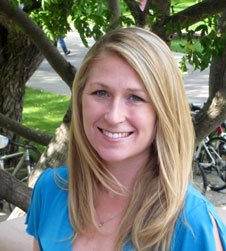 Friday, 20 April 2018
Friday, 20 April 2018
Dr Susan Houge Mackenzie
The rapid growth of adventure tourism has created opportunities in New Zealand, but the well-being of tourist guides is often overlooked.
Yet guide behaviour plays a critical role in tourist satisfaction, and knowing how adventure tourism impacts the psychological well-being of its guides is vital to developing sustainable industry practices.
University of Otago Business School Tourism researcher Dr Susan Houge Mackenzie says there is little research on guide-to-guide and guide-to-employer relationships, for example, because guide-to-client interactions and client experiences tend to receive the most attention from industry and researchers.
Dr Houge Mackenzie's research into stress and employee experiences in tourism management overseas show demanding lifestyles, high-pressure work environments, and intensive co-worker interactions can have negative effects.
In particular this can affect interpersonal relationships, work-related anxiety, burnout and turnover of the adventure worker.
The emotional demands of service work stem from factors including training processes; interactions with clients, other guides and managers; safety management issues; environmental hazards and employment uncertainty due to seasonal demand or immigration issues.
Guides often experienced fear and anxiety, contrary to clients' 'heroic expectations' of fearless leaders. However, while client interactions and environmental hazards could cause anxiety, they could equally also generate intense excitement and enjoyment that supported well-being.
Other factors that influenced how guides experienced their work include confidence in personal skills; trust and personal relationships with co-guides; familiarity with their equipment; knowledge of the natural environment; physical fatigue; guide-to-client ratios; client characteristics; trip logistics; and the matching of challenges with their skills levels while training and guiding.
Dr Houge Mackenzie says these findings are highly relevant now as tour guiding evolves from simply delivering facts and navigating destinations for clients, towards 'co-created' tours where guides facilitate meaningful intragroup or intrapersonal experiences.
That means guides have considerable influence on tourists' experiences, depending on how they 'broker' physical access and personal encounters. Understanding factors that benefit or detract from co-created tours and brokering may therefore optimise both guide and client experiences.
Dr Houge Mackenzie is hoping to expand this research to focus on well-being in New Zealand destinations for guides, host communities and tourists. She is particularly interested in motivations and emotional experiences, including perceptions of risk and fear, and implications for guide and client well-being and safety.
About the research
Dr Houge Mackenzie has studied stress and emotions resulting from guiding work and employer-guide interactions in several global adventure tourism destinations.
She was one of the first to analyse the emotional experience of team guiding in an adventure setting, by looking at a river guiding. This study analysed critical incidents from longitudinal information captured during a 10-year span of white-water river guiding in the northern and southern hemispheres.
She also evaluated physical access, encounters, understanding, and empathy on one of the world's most popular guided adventure tours: the Inca Trail in Peru.
Each of these four domains posed an opportunity for guides to create unique and meaningful tourism experiences, extending beyond more standardised, passive delivery of information to tourists.
The main message of these diverse studies is the need to reconceptualise tourism as a vehicle for individual growth and social well-being for both suppliers and consumers, rather than simply a means of economic growth.
"Thinking about tourism from this well-being perspective opens up a much broader range of strategies for sustainable tourism management.
"This research also encourages us to seriously consider the well-being of people and communities that provide tourism experiences alongside the tourist experience.
"Well-being research has the potential to inform the emerging field of positive tourism and assist with sustainable destination planning and strategies for employee, host community and tourist experiences."
The research supports the University of Otago interest in wellness research. The University's Department of Tourism is a new World Leisure Center of Excellence, a prestigious global network of research and teaching organisations dedicated to discovering and fostering the leisure experience as a force for human development and well-being.
For further information, contact:
Dr Susan Houge Mackenzie
Department of Tourism, University of Otago
Tel 64 3 479 8520
Mob 64 21 129 9585
Email susan.hougemackenzie@otago.ac.nz
A list of Otago experts available for media comment is available elsewhere on this website.
Electronic addresses (including email accounts, instant messaging services, or telephone accounts) published on this page are for the sole purpose of contact with the individuals concerned, in their capacity as officers, employees or students of the University of Otago, or their respective organisation. Publication of any such electronic address is not to be taken as consent to receive unsolicited commercial electronic messages by the address holder.








